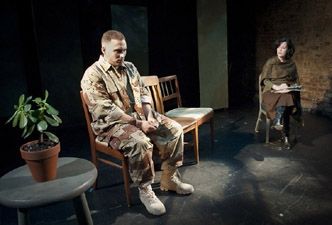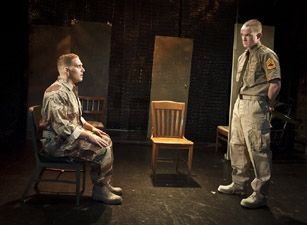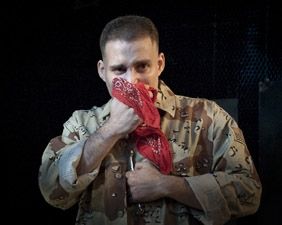Photo Flash: The Driling Co Announces The Return Of RESERVOIR 4/1-17
To share the outstanding play of its 2010-2011 season with the widest possible audience, The Drilling Company will mount a return engagement of "Reservoir" by Eric Henry Sanders from April 1 to 17, 2011. The play is a highly-charged, explosive new work that reveals how the tragedy of a distant war seethes within us. Buchner's "Woyzeck" is re-imagined as the unsettling homecoming of a Mideastern War veteran--a lowly truck mechanic with PTSD. Sanders peers into the souls of the soldier, his Staff Sergeant, his military psychiatrist (a woman), his closest buddy from overseas who is now serving with him stateside, and his girlfriend who is mother of his infant son. Hamilton Clancy directs. The plain-spoken, powerful drama hits with the force of a mass outcry in our war-weary age.
The show has already been extended once, having impressed audiences and reviewers alike. It was originally presented November 4 to 21, 2010 and was brought back January 6 to 16, 2011. The New York Times (Daniel M. Gold) called the production "a timely, urgent reimagining, smartly written," explaining, "Unlike the stick-figure supporting characters in 'Woyzeck,' Mr. Sanders's people are instilled with a nuanced sympathy....In the end, perhaps the best lesson from "Reservoir" is how to draw new meaning from a classic." Nytheatre.com (Aimee Todoroff) wrote, "Reservoir is an ambitious work, full of beautiful parallels that successfully push the original work in new directions. It is also an important subject, and the play brings a unique perspective to the issue of returning war veterans suffering with PTSD. Hopefully, Reservoir will have the opportunity to reach the large audience it deserves."
Private Frank Hasek, a young veteran of a foreign war, returns home to await his redeployment. While suffering from the strains of Post Traumatic Stress Disorder, he struggles to keep his job as an Army mechanic in order to support Marisa, the mother of his newborn son. He has maintained the vehicles that American troops have driven through occupied cities, often in a state of fright and at peril to civilians in their path. Unsettling visions of what he has seen and a series of unfortunate events threaten to upend his career and derail his relationship with Marisa. Although Hasek seeks help from an overworked psychiatrist at VA hospital, his behavior becomes increasingly erratic and threatens to turn violent when he discovers that Marisa is having an affair with his Staff Sergeant.
"Reservoir" parallels the plot of "Woyzeck" in dark and suggestive ways, so much so that audiences recall Buchner's masterpiece and think, "So that's what he meant." We do not know Buchner to be a veteran of the wars of his time, but his masterpiece adapts perfectly into a play about the dehumanizing effect of modern war and its enduring wounds. The language of Sanders' play is not that of Buchner's expressionism but rather contemporary realism, yet Buchner's themes reverberate. Set in a military base outside a depressed town--like those awash in tattoo parlors, check-cashing services and cheap bars--the play comments on social conditions as well as complex themes of poverty. The tragedy of Hasek as a downtrodden man broken by war is sensitive, touching and much in tune with our concerns toward the veterans who are returning from our current wars.
Playwright Eric Henry Sanders wrote, when he was awarded a fellowship by the Massachusetts Cultural Council, "It is a tragic irony that with the latest advances in battlefield medicine a wounded US soldier has a better chance of surviving a physical injury than ever before, only to suffer a greater likelihood of psychological trauma, such as Post-Traumatic Stress Disorder (PTSD), when returning to civilian life." His initial thought was to write a contemporary adaptation of "Woyzeck" which would acknowledge these struggles by depicting the protagonist as a soldier suffering from the psychological strains of active duty. As he began to write, he found himself moving away from a strict adaptation of Buchner's original text, but not so far as to lose the poignance of the parallel characters. Marisa is, in her essence, Woyzeck's Marie. The Sergeant replaces Woyzeck's Captain, down to the shaving scene. In the source play, it is the humiliation of Woyzeck by his Doctor (who prescribes a diet of peas) and his Captain which ultimately pushes him over the edge. In "Reservoir," the doctor is replaced by a female psychiatrist who seems effective and caring, but her prescription of anxiety-soothing drugs is too little, too late.
"Reservoir" was initially developed through two readings at The New Group (directed by Ian Morgan) and The Astoria Performing Arts Center (directed by Tom Wojtunik) and further refined in the Spring of 2010 in The Drilling Company's Discovery Series, which develops new works by giving writers, director and actors a month to rehearse them and make changes before presenting a reading of the works for backers. The Drilling Company's Artistic Director, Hamilton Clancy, chose to present the work because he thought it was the right time to examine the effects of war on those who fight it, since we are now looking forward to many troops coming home.
Tragedy has a special place in our national psyche at such times. Playwright Sanders cites as one of his inspirations various scholarly texts that have fused readings of classic Greek theatre with the psychological impact of war on returning veterans, including Bob Meagher's "Herakles Gone Mad" (2006) and Jonathan Shay's "Odysseus in America" (2002). In the latter book and also in Shay's "Achilles in Vietnam" (1995), Shay writes, based on his experience in the treatment of Vietnam veterans, that group therapy is the most effective method of assisting combat veterans to recover from the trauma associated with combat and to reintegrate with society. He argues elsewhere that the performance of tragedy, with its katharsis of pity and fear, before an audience of veterans, may have performed an analogous function in the Athenian polis. Even if we are not veterans and regardless of our views on foreign policy, we all identify strongly with those who have sacrificed. Frank Hasek's story is likely to be seen as a "low tragedy," to which we will actually respond with gratitude.
"Reservoir" will be the eighth full length world premiere presented by The Drilling Company. Previous ones include "Windows on the World" by Peter Killy (2004 NYInt. Fringe Fest ), "Big Apples" by Stephen Bittrich (2005), "Mutant Sex Party" by Edward Manning (2006), "Dealers" by Neil Olson (2006), "Atomic Farmgirl" by C. Denby Swanson (2007) and "Over the Line" by P.Seth Bauer (2009). The Drilling Company is has produced short play projects around common themes for over 11 years and playwright Eric Henry Sanders has had three short plays premiered in these projects.
The Drilling Company is also well-known for its productions of Shakespeare in the Parking Lot. This summer, its "Julius Caesar" received widespread attention.
"Reservoir" is designed by Jennifer Varbalow and features Alessandro Colla as Hasek, McKey Carpenter as the Staff Sergeant and Karla Hendrick as the psychiatrist. Kendall Rileigh takes over the role of Marisa, Hasek's wife. The role of the Army Buddy is being recast as of this writing. Costume design is by Lisa Renee Jordan.
Plays by Eric Henry Sanders have also had performances and staged readings in theatres across the country and abroad, including the Union Theatre (London), New Group (NY), Primary Stages (NY), Cherry Lane Alternative (NY), Abingdon Theatre (NY), Victory Gardens Theatre (Chicago), the Actor's Gang Ivy Substation (LA), and Moving Parts Theatre (Paris). He is the recipient of the prestigious 2009 Artist Fellowship in Playwriting from the Massachusetts Cultural Council. His other honors include being nominated for the Kesselring Prize administered by the National Arts Club (NY), a runner-up for the Princess Grace Fellowship administered by New Dramatists, and a finalist for the New Work Festival at the Center Theatre Group (Mark Taper Forum). He teaches narrative and screenwriting at Hampshire College.
Hamilton Clancy (Director) is founder and producing Artistic Director of The Drilling Company. He staged this summer's production of "Julius Caesar" in the Parking Lot and also played Caesar. He has directed The Drilling Company's world premieres of "Mutant Sex Party" by Edward Manning, "Over the Line" by NYIT award winning P. Seth Bauer and "Bird Brain" by Vern Theissen, winner of the Canadian Govenor's award. He has produced other premieres including "Atomic Farmgirl" by C. Denby Swanson (recognized with grants from the McKnight Foundtion, Jerome Foundation and TCG), "Windows on the World" by Peter Killy, "Big Apples" by Stephen Bittrich and "Dealers" by Neal Olson. For The Drilling Company, he has commissioned and produced over 200 short plays, including an early short version of the Pulitzer Prize recognized "Thom Pine:based on nothing" by Will Eno, in which he also originated the title role, and Vincent Delaney's Heidemann award winning short, "KUWAIT." He has also produced and directed multiple works by Andrea Moon, Brian Dykstra, Scott Baker and Eric Henry Sanders. Aside from these, he has maintained a prolific career as a working actor.
Videos






